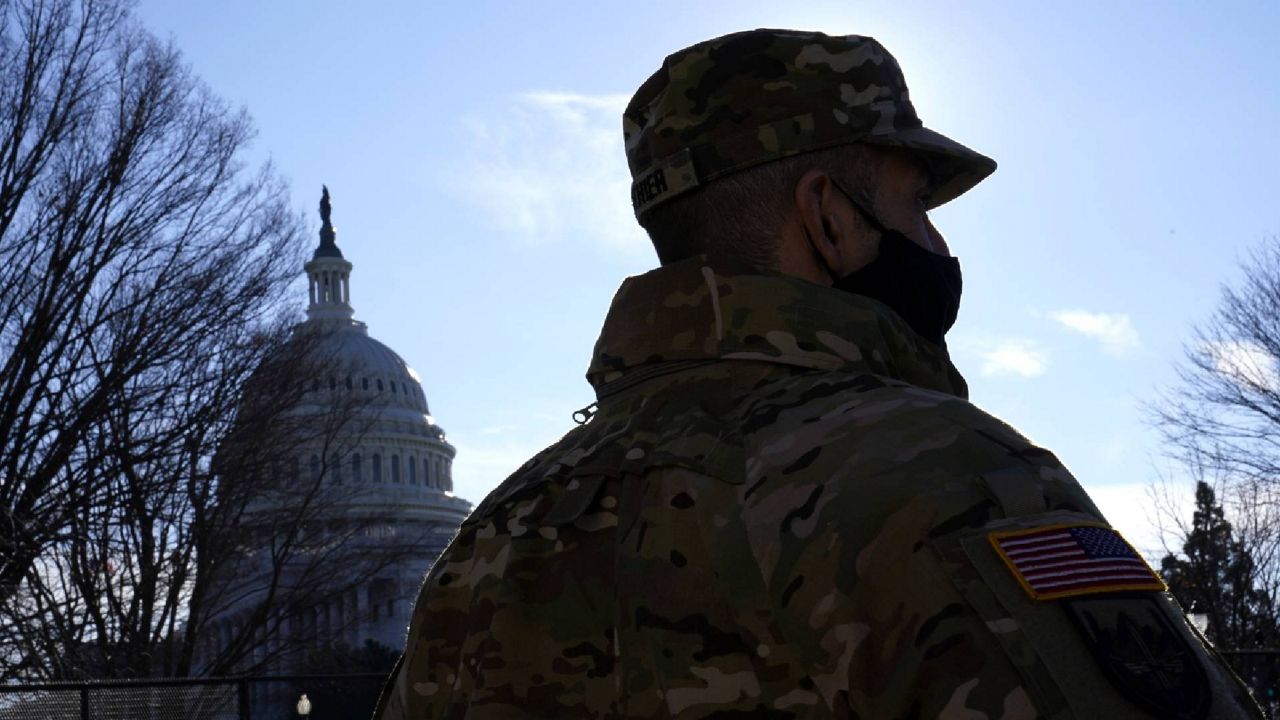The U.S. Capitol and Washington, D.C., will see an influx of federal troops and additional security measures in the coming days as the city prepares for Joe Biden’s inauguration and potentially violent protests planned against his election.
On Jan. 20, the scene at the capitol will look dramatically different from Jan. 6, when the building was protected by only a thin line of Capitol Police officers. It wasn’t until hundreds of the president’s supporters pushed their way inside that the building’s police force called in D.C. officers. The National Guard arrived a couple of hours after the initial siege.
This time, the Capitol Police have requested federal help in advance. National Guard Bureau Chief General Daniel Hokanson said Monday that his department is authorized to send up to 15,000 troops to D.C., with at least 10,000 expected to arrive by this Saturday.
Already, more than 6,000 troops are on the ground, including from surrounding states like Virginia, Maryland, Pennsylvania Delaware, New York and New Jersey. Many were guarding the Capitol as of Monday.
“As always, our first priority is to protect people and property,” Hokanson said. “The National Guard looks forward to working with our district and federal partners to ensure a peaceful inauguration.”
While the National Guard is typically called on for Inauguration Day — including 8,000 troops when President Trump was sworn in — there’s added attention on federal support after agents were delayed last Wednesday.
On Monday, Rep. Tim Ryan (D-OH), who chairs the subcommittee that oversees the Capitol Police, told reporters that Congress will provide additional funding for security on inauguration day. Plus, the entire capitol building remains surrounded by a seven-foot high black fence, which is scheduled to stand through Jan. 20 and the days after.
The Secret Service will take the lead on inauguration security, since they are responsible for planning and executing operations for any National Special Security Event (NSSE).
Prior to the news of his resignation on Monday, Acting Homeland Security Secretary Chad Wolf designated inauguration as an NSSE starting Wednesday, Jan. 13, six days earlier than planned, citing “events of the past week.”
“Most security is now built on a scenario type basis,” said Dr. Scott White, director of the cybersecurity program at George Washington University. “It wouldn't surprise me that this type of scenario would now be built into the security plan. Perhaps it wasn't there before. The idea of several thousands of people storming the Capitol.”
The news of boosted security came as the FBI issued a warning about planned protests in D.C. starting as early as Jan. 17, along with others at state capitols around the country, according to an ABC News report.
“There’s this inherent conspiracy-oriented nature to [these organizations],” Dr. White said. “This will be a date that, you know, now lives with their organization, as a proud day of uprising.”
President-elect Biden told reporters Monday that he's "not afraid" of taking his oath of office outside, despite the threat of another large gathering at the Capitol Building.
The D.C. police department has already activated its entire police force and will keep them on standby through the inauguration, an all-hands-on-deck approach they took on Jan. 6 as well.
On Monday, D.C. Mayor Muriel Bowser urged Americans to stay away from the city during next week’s inauguration and instead watch the event virtually. She expressed hope about the city’s preparation to handle new threats.
“We also know that Trumpism won’t die on January 20, but our American values and our D.C. values are stronger than one ideology,” Bowser said Monday. “We will overcome this extremism together.”
There are growing calls for hotels and Airbnb to cancel reservations in and around Washington to prevent people from traveling to the city. On Monday, Airbnb said it will continue to ban “violent hate group” members when possible, but it did not commit to a sweeping cancelation of reservations.
A few hotels suspended reservations last week, but just one has announced its intention to do the same for the inauguration, according to the tourism group Destination DC.
Bowser said she also asked the president to approve a “pre-emergency” declaration for the inauguration, which the city was granted in 2009 ahead of President Barack Obama’s swearing-in. The declaration can speed up coordination between the city and federal agencies as they prepare for next Wednesday.
“If I’m scared of anything, it’s for our democracy,” Bowser said when asked if she feared potential threats next week.
The mayor has called on the National Park Service to cancel all public gathering permits for next week. Last week, the agency approved permits for a handful of events adding up to more than 30,000 people, including the gathering where President Trump spoke and urged supporters to march to the capitol.
“When the President began that speech … you could just see the crowd being mobilized,” Dr. White said.
“This is ultimately the challenge for any liberal democracy — how to secure the rights of the individual whilst at the same time, you know, protect those institutions of the state,” he added.
Investigations into the police response at the capitol last week are ongoing. On Monday, Rep. Ryan (D-OH) said that two officers had already been suspended — one who took a selfie with the intruders and another who donned a MAGA hat and directed rioters where to go.
The Capitol Police will also be involved in inauguration day security, but it’s unclear how their role will change after last week. The agency did not respond to Spectrum News’ request for comment.



